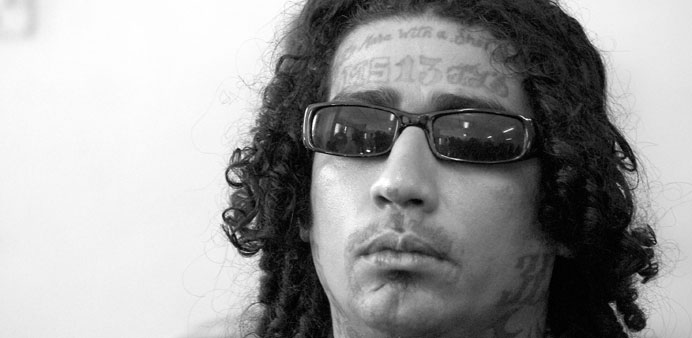* A member of the Mara Salvatrucha (MS13) gang in the Zacatecoluca top security penitentiary. A ceasefire or truce among the two main gangs in El Salvador has led to a drop in murders and other crimes.
By Juan Jose Dalton
The dreaded Mara Salvatrucha (MS13) drug gang is in control in this place. You can tell by the graffiti on the walls and how the young men display their tattoos on their arms and other parts of their bodies. These are the tattoos that spark terror in Salvadoran society because people fear the gangs so much.
The gang members hide nothing: this is their district, their territory in the middle of the slum city of Mejicanos on the outskirts of San Salvador. Somebody who is not familiar with the neighbourhood would not dare to walk up the narrow street along which dozens of small houses, shops and small commercial venues of all kinds are lined. It looks like a favela in Brazil.
The man who is serving as a guide told this correspondent that “If it were not for this vehicle you would not be able to penetrate 10m into this neighbourhood without being detained and your life would be in grave danger.”
Currently a truce is in effect between the two large rival gangs in El Salvador: the MS13 and the District 18 gang, also known as Tribe 18. The ceasefire or temporary suspension of gang warfare, promoted by the Catholic Church and supported by the leftist government of President Mauricio Funes, has led to a drop in homicides. The rate has gone down from 15 to five per day.
Official and independent sources say that other crimes such as extortion and sexual violation have also diminished, but society is still fearful and the perception of violence and danger remains high.
A metal gate opens silently and a “calm” drug gang member — one who does not take part in illicit acts — welcomes the visitors with a smile. “We have been expecting you for a while.”
The man identifies himself as “Edwin”, says he is 36 and joined the MS13 when he was 14. “The gang is my family; we are siblings: if one eats we all do,” he said. Edwin is wearing a sleeveless T-shirt to show the tattoos he has on his shoulders and both arms.
“This tattoo is of the MS13 gang, the ‘Mara Salvatrucha’. It identifies us, gives us a sense of belonging. This other one represents our lives (it shows a two-faced clown, one face is laughing, the other weeping),” said Edwin who explained that he went to school as far as high school level and now works in a bakery as part of his return to the world of work.
Edwin also has tattoos on his stomach, MS written in Gothic letters, and on his back there is a woman’s name which he says is the name of his mother.
Asked what was the saddest moment of his time in the gang, Edwin said it was when he had been incarcerated for several crimes and heard that his younger brother had been murdered.
“It was very sad, even worse because I was in prison.”
His happiest moments were “without a doubt” the births of his three children. The oldest is 12, and the youngest two. “The only thing I want is that they do not choose the path I chose,” he added.
Sociological studies indicate that the average lifespan of a gang member is 35.
Edwin says that not every gang member can apply tattoos. It is up to those who train and learn how to do it properly. “It is an art, even though it hurts because it is our skin. We suffer, but it is momentary. I intend to keep my tattoos because I like them.”
During the “hard-line” administrations of former Salvadoran presidents Francisco Flores (1999-2004) and Tony Saca (2004-2009), gang members stopped tattooing themselves altogether or had tattoos made in little-seen places such as on their legs, behind their ears or on their skulls.
Using the tattoos as criminal evidence, police were sweeping up the gang members and throwing them into jail.
Tattoos are so linked to criminals that in some cases innocent young people who had not committed crimes were sent to prison simply because of their tattoos. In prison they lost that innocence.
“Prisons have been crime schools and places to become more sophisticated for the gangs or ‘maras’,” said an expert on social violence, Jeannette Aguilar. She’s the director of the University Public Opinion Institute at the Central American University of El Salvador.
Upon exiting “gang territory” one arrives at the church of Saint Francis of Assisi in Mejicanos. Catholic priest Antonio Rodriguez, in charge of the church, is much loved in the neighbourhood and on occasion disliked by the authorities. He arrived from Spain in 2000 and since then has worked with young gang members trying to re-enter society.
“Tattoos give the young people identity, but they have deeper marks because of the violence and the exclusion in which they have lived,” said Rodriguez, who is known as “Father Antonio”. These are the scars of the suffering they have borne and “the exclusion of thousands of young people with no future and a faceless, inhuman state,” he added.
Father Antonio sponsors a programme called “Goodbye Tattoos” to remove the marks of the gangs from members of both sexes.
“I have witnessed the process of erasing tattoos. Some of the gang members, even though we live in such a macho society, wept. This is because they are rubbing out their identity, their memory,” he said.
“Tattoos can be rubbed out, but they can never erase the scars on their souls. This society must become complete in human development with a social sense; alienation must disappear and society too must remove the tattoos it has on its soul, so that violence can end completely,” said Father Antonio.

